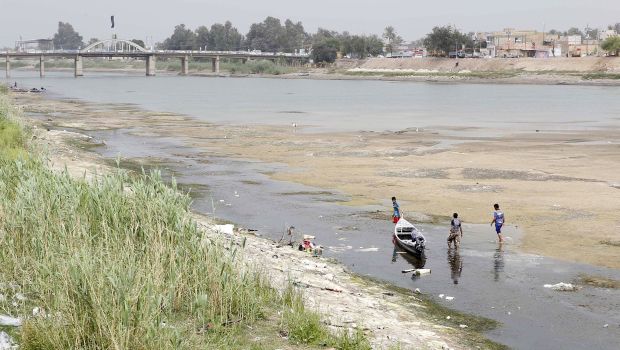
Iraqi men move a boat stuck on the banks of the Euphrates east of Karbala due to a decline in the water level after supplies were blocked by anti-government fighters who control access to a dam further upstream in conflict-hit Anbar province on April 8, 2014. (AFP PHOTO / MOHAMMED SAWAF)
Baghdad, Asharq Al-Awsat—A pro-government Iraqi militia leader said on Tuesday that government forces had thwarted attempts by the Islamic State of Iraq and Syria (ISIS) to sabotage the country’s water distribution system.
The Leader of the Sons of Iraq Council, Mohammad Al-Hayis, said government troops and allied tribal fighters forced ISIS to reopen the Nuaimiyah Dam on the Euphrates, restoring water supplies to a number of villages in central and southern governorates
Hayis told Asharq Al-Awsat: “The terrorists . . . realized after closing the dam gates—which resulted in a rise in water levels behind the dam—that if the closure continued, they will be besieged twice, once by the armed forces, and the second by rising water, and if they had to withdraw, they would drown, which in turn forced them to reopen the floodgates.”
Hayis added: “ISIS has two objectives: on the one hand, they want to drown the areas surrounding Fallujah, but the sudden attack by the army foiled that plan; on the other hand, they want to cut off water supply to the central and southern governorates in order to give their war a sectarian dimension.”
Iraqi Minister of Water Resources Mohannad Al-Saadi announced the reopening of the four floodgates of the Fallujah Dam on Monday. Saadi issued a statement which said: “Continuing to have the Fallujah Dam under the control of the armed men, and damaging the body of the dam and the banks of the canal, would lead to negative effects on water resources in the central and southern governorates.”
Meanwhile, Iraqi parliamentary speaker Osama Al-Nujaifi condemned the actions of ISIS. A statement issued by Nujaifi’s office on Monday said: “We find this act which is directed at the Iraqi people abhorrent and strongly condemn it, and we call on our people in Anbar to confront this destructive act and resist all terrorist attacks which target the unity of our people and their security, stability and safety.”
Nujaifi also called on Baghdad and the Iraqi security forces to exercise restraint in their attempts to retake areas of Anbar province seized by insurgents at the end of last year, saying: “We renew our rejection of the heinous acts committed against our people in Fallujah under the pretext of fighting terrorism and pursuing terrorists. We call for an end to causing more harm to them and to adopt a professional approach in pursuing anyone who is proven to be involved in terrorism.”
Hamid Al-Mutlaq, member of the parliamentary Wataniya bloc for the Anbar Governorate, told Asharq Al-Awsat that the incident proved the government had failed to resolve the endemic security crisis
He said: “What happened proved the weakness of the government and its failure to protect people and provide them with stability . . . the government is now condemning the action like all others, while it is actually responsible for providing people with protection from gangs, terrorists and militias, because we look at terrorism as one issue regardless of its sources.”
In a related issue, the Iraqi authorities say 44 ISIS members were killed in two military operations on Tuesday.
Interior Ministry spokesman Saad Maan told the French news agency AFP that “a unit from the 17th Brigade laid an ambush for ISIS members planning to attack a military post in Duwailabiyah south of Baghdad, and killed all 25 of them.”
The spokesman also said “a rapid intervention squad supported by the air and artillery forces attacked two ISIS positions in Fallujah, killing 19 and injuring 27 . . . the bombardment targeted the two positions during a meeting of senior ISIS leaders in Fallujah. The attack also destroyed five vehicles and a large storage place of explosives and weapons.”

Trackbacks/Pingbacks